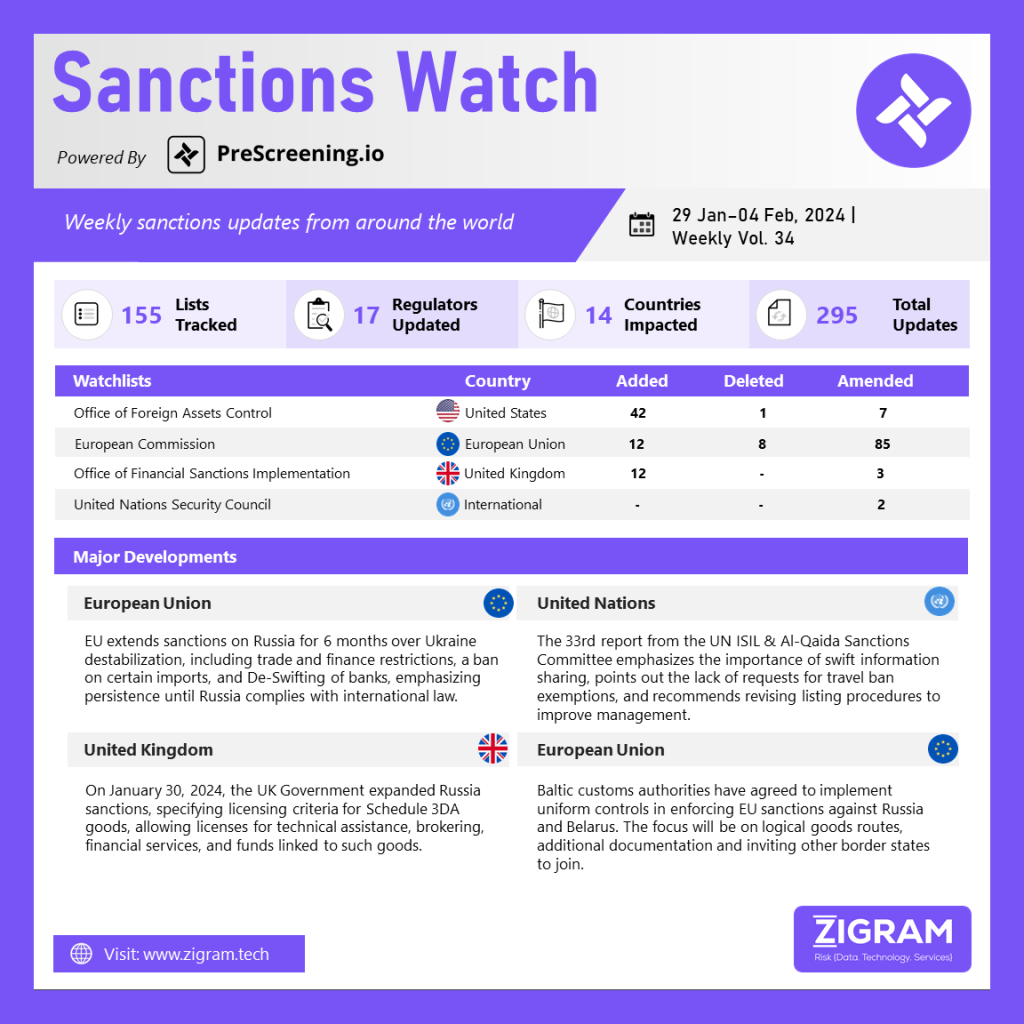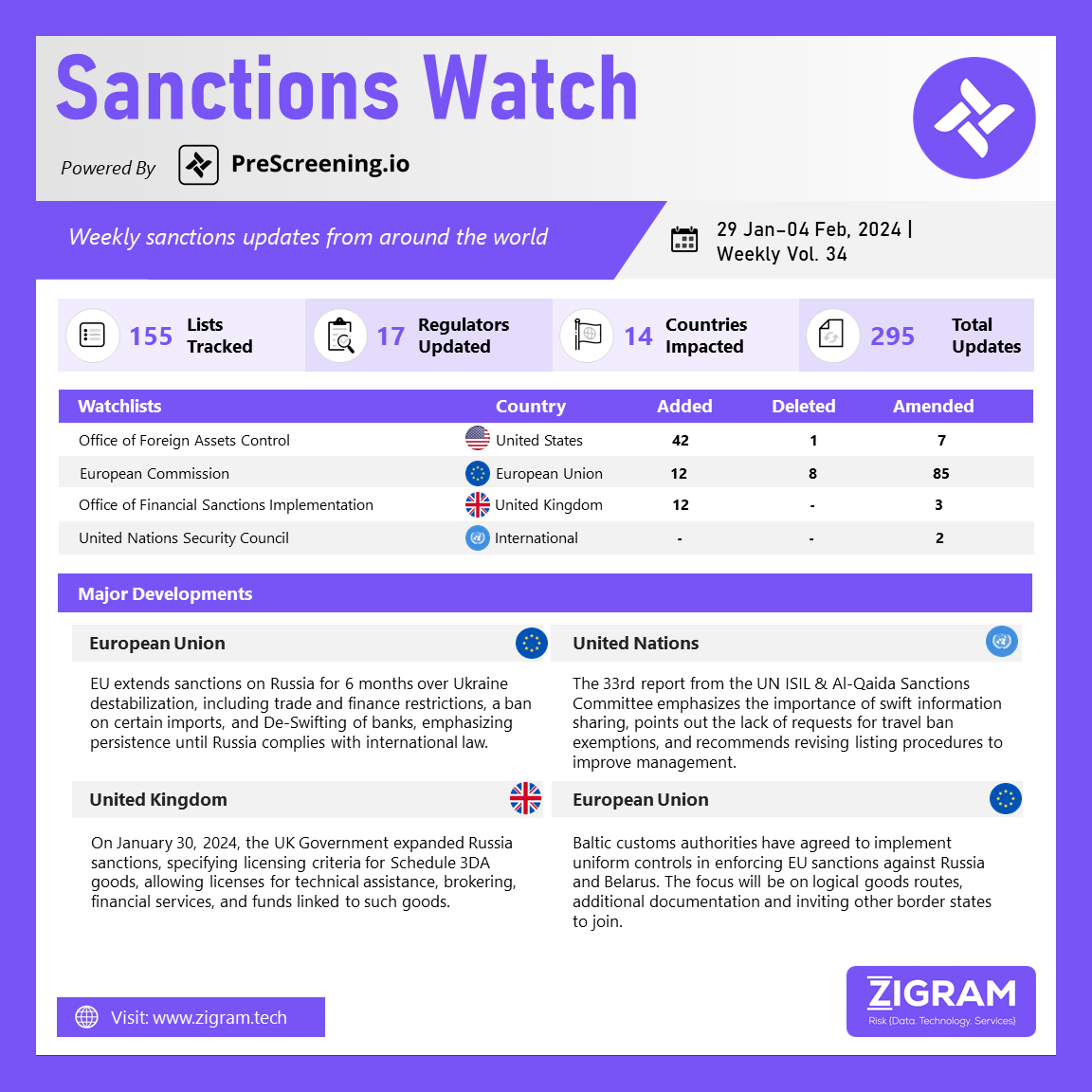Published Date:
In the latest edition of our Sanctions Watch weekly digest, we present significant updates on sanction watchlists and regulatory developments.
The EU Council extended its sanctions against Russia until July 31, 2024, citing the country’s persistent destabilizing actions in Ukraine. Originating in 2014 as a response to Russia’s initial destabilization efforts in Ukraine, these sanctions were augmented post-February 2022 due to Russia’s unwarranted military aggression against Ukraine. The current measures span various sectors, encompassing trade, finance, technology, dual-use goods, industry, transport, and luxury items. Notable components include restrictions on seaborne crude oil and certain petroleum product imports from Russia, de-SWIFTing of Russian banks, and the suspension of licenses for Kremlin-backed disinformation outlets. Emphasizing the gravity of Russia’s breach of international law, particularly the prohibition on using force, the Council asserts the necessity of maintaining and, if required, augmenting these measures to counteract sanctions circumvention.
The 33rd report from the UN ISIL & Al-Qaida Sanctions Committee Monitoring Team highlights several key points. Firstly, member states’ insufficient responses to information requests concerning listed individuals and entities underscore the imperative for enhanced information sharing to promptly update list entries and narrative summaries. The report notes the absence of travel ban exemption requests, but the Committee did receive and approve six requests for asset freeze exemptions, with five allocated for basic expenses and one for extraordinary expenses. Additionally, the Monitoring Team recommends a comprehensive study to evaluate updating the standard form for listing individuals and entities under the ISIL (Da’esh) and Al-Qaida regime. This includes exploring tools that could enhance the efficiency of list management, emphasizing the need for continual improvement in addressing global security concerns.
The United Kingdom has recently updated its sanctions guidance about Russia, specifically addressing licensing grounds related to Schedule 3DA revenue-generating goods. This includes provisions for when a license might be granted for activities such as technical assistance, brokering services, financial services, or funds associated with goods falling under Schedule 3DA. Licenses may be considered for goods falling under Part 2 of Schedule 3DA if linked to contractual obligations established before June 23, 2022 (or October 29, 2022, for codes 2208 and 2303). Similarly, for goods falling under Part 3 of Schedule 3DA, licenses may be granted if tied to contractual obligations from agreements concluded before April 21, 2023. Additionally, the guidance outlines conditions under which licenses may be issued for the movement of vessels, aircraft, or aero gas turbine engines controlled under Schedule 3DA, transitioning from Russia to a third country or the UK.
Estonia, Latvia, and Lithuania have pledged to implement consistent customs controls and enhance information exchange by January 31, 2024. Their collective effort is driven by the recognition that closing loopholes and effectively enforcing sanctions are crucial in bolstering their impact and disrupting Russia’s aggressive actions in Ukraine. The agreement encompasses key principles for a unified approach in handling cases involving the detection of illogical routes for goods. Additionally, the three Baltic nations commit to requesting supplementary documentation related to the transit or end use of goods, as well as seeking additional declarations from manufacturers and exporters to mitigate the risk of sanctions circumvention. Furthermore, the trio aims to extend invitations to other bordering states, urging them to join in adopting a regional uniform approach towards the implementation of sanctions.
- #EU
- #Russia
- #Ukraine
- #MilitaryAggression
- #DualUseGoods
- #CrudeOil
- #UN
- #ISIL
- #Al-Qaida
- #TravelBan
- #SanctionsWatch
- #RegulatoryCompliance
- #TradeCompliance
- #SanctionsEnforcement
- #SanctionsMonitoringBoard
- #RegulatoryObligations
- #SanctionsBreaches
- #Compliance
- #AssetFreeze
- #UK
- #Vessels
- #MoneyLaundering
- #Aircraft
- #Estonia
- #Latvia
- #Lithuania
- #CustomsControls
- #BalticCountries


